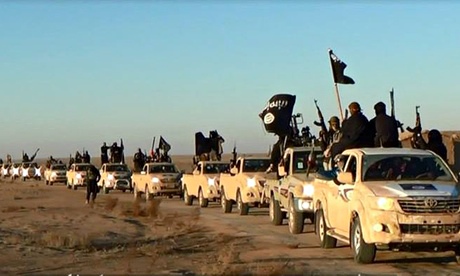
Barack Obama had insisted on a visible coalition being formed with Sunni Arab states before expanding operations into Syria
Jordan became the first US ally to confirm its forces had taken part in attacks against Isis in Syria. Washington said the Saudi Arabian, UAE and Bahraini militaries had also contributed forces, with Qatari assets playing a support role.
It was not immediately clear which, if any, of the Arab air forces sent their jets over the skies of northern Syria. However, ahead of the strikes, Riyadh had agreed to spearhead the assault on Isis, which it views as a mortal threat to its own borders.
The willingness of Sunni states to openly deploy their militaries is a marked departure from their long-held preference that the US use its powerful military to protect their regional interests.
Anxious to avoid the perception of launching a “war on terror redux”, Barack Obama, had insisted on a visible coalition being formed with Sunni Arab states as a pre-condition of expanding operations from neighbouring Iraq, where the US has been attacking Isis for the past month.
Isis has drawn extensive support from a Sunni support base that has been increasingly disenfranchised over more than a decade – first by the invasion of Iraq, which toppled key patron, Saddam Hussein, and then by a series of developments perceived by many as having advanced the interests of Shia Iran.
The involvement of the regional Sunni powerhouses is designed to counter that narrative and assure Sunnis of alternative means of support, despite the near collapse of governance across the Levant states of Iraq, Syria and Lebanon.
The US denied a Syrian claim that it had advised Damascus before launching the attacks. The regime of Bashar al-Assad had insisted that any attacks on Isis inside Syria be co-ordinated with it ahead of time. That demand had been rebuffed by members of the new coalition, and by Britain, which believes a tacit alliance between the Syrian regime and Isis led to the group gaining a regional foothold.
Military planners in Washington have suggested the campaign inside Syria is likely to be long and that operations against Isis in Iraq will be considered as part of the same campaign.
Ahead of the strikes, Isis leaders had pledged to defy the US and had called for attacks to be launched on US, European and Australian soil.
In an audio statement released on Sunday, senior Isis leader Abu Mohammed al-Adnani urged the group’s supporters to kill “disbelievers” : “If you can kill a disbelieving American or European, especially the spiteful and filthy French, or an Australian, or a Canadian, or any other disbeliever from the disbelievers waging war, including the citizens of the countries that entered into a coalition against the Islamic State, then rely upon Allah, and kill him in any manner or way, however it may be,” he said.
One of Isis’s stated aims is to remove the borders between Iraq and Syria, which took shape after the fall of the Ottoman empire, and impose its hardline interpretation of Sunni Islam enforced by a new Caliph, Abu Bakr al-Baghdadi.
The group’s stunning gains over the summer, when the Iraqi army abandoned the Arab north of the country greatly furthered that goal. The 800-mile border is now irrelevant, with Isis able to freely move looted military hardware between the two states, and gather new backers.


No comments:
Post a Comment